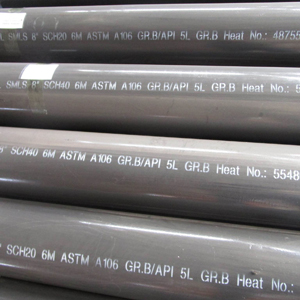Industry News
The correct selection of seamless carbon steel pipes
Posted: 07/08/2020 12:08:50 Hits: 63
Seamless steel pipe is a steel pipe without welding seam manufactured by hot processing methods such as perforated hot rolling. If necessary, the hot-processed tube can be further cold-processed to the required shape, size and performance. At present, seamless steel pipes (DN15 - DN600) are the most widely used pipes in petrochemical production plants.
Seamless Carbon steel pipe
Material grades: 10, 20, 09MnV, 16Mn.
Standard: GB8163 "Seamless Steel Pipe for Fluid Transportation"
GB/T9711 "Technical Conditions for Delivery of Steel Pipes for Oil and Gas Industry"
GB6479 "High-Pressure Seamless Steel Pipe for Fertilizer Equipment"
GB9948 "Seamless Steel Pipe for Petroleum Cracking"
GB3087 "Seamless Steel Tubes for Low and Medium Pressure Boilers"
GB/T5310 "Seamless Steel Pipe for High Pressure Boilers"
GB/T8163:
Material grades: 10, 20, Q345, etc.
Scope of application: oil, gas and public media with design temperature less than 350℃ and pressure less than 10MPa
GB6479:
Material grades: 10, 20G, 16Mn, etc.
Scope of application: oil, gas with design temperature -40 - 400℃ and design pressure 10.0~32.0MPa
GB9948:
Material grades: 10, 20, etc.
Scope of application: where the GB/T8163 steel pipe should not be used.
GB3087:
Material grades: 10, 20, etc.
Scope of application: superheated steam and boiling water in low and medium pressure boilers.
GB5310:
Material grade: 20G, etc.
Scope of application: superheated steam medium of high-pressure boiler
Inspection: General steel pipe for fluid transportation must be subjected to chemical composition analysis, tension test, flattening test and hydrostatic test.
GB5310, GB6479, GB9948 standard steel pipes, in addition to the tests that must be carried out for steel pipes for fluid transportation, also require flaring tests and impact tests.The inspection requirements for the manufacture of these three steel pipes are relatively strict.
The GB6479 standard also makes special requirements on the low temperature impact toughness of the material.
In addition to the general test requirements for steel pipes for fluid transportation, GB3087 standard steel pipes also require cold bending tests.
In addition to the general test requirements for steel pipes for fluid transportation, GB/T8163 standard steel pipes are subjected to flaring tests and cold bending tests as required by the agreement. The manufacturing requirements of these two pipes are not as strict as the previous three.
Manufacturing: GB/T/8163 and GB3087 standard steel pipes are mostly smelted in an open furnace or converter, and there are relatively many impurity components and internal defects.
GB9948 mostly adopts electric furnace smelting. Most of them are treated with refining process outside the furnace, and the composition and internal defects are relatively few.
The GB6479 and GB5310 standards themselves stipulate the requirements for refining outside the furnace, with the least amount of impurities and internal defects, and the highest material quality.
The order of the manufacturing quality of the above several steel pipe standards from low to high:
GB/T8163<GB3087<GB9948<GB5310<GB6479
Selection: In general, the steel pipe of GB/T8163 standard is suitable for oil, gas and public media with design temperature less than 350℃ and pressure less than 10.0MPa;
For oil and gas media, when the design temperature exceeds 350℃ or the pressure is greater than 10.0MPa, steel pipes of GB9948 or GB6479 standards should be used;
For pipelines operated by hydrogen or pipelines working in environments with stress corrosion tendency, GB9948 or GB6479 standards should also be used.
All carbon steel pipes used at low temperature (less than -20℃) should adopt the GB6479 standard, and only it specifies the requirements for the low temperature impact toughness of the material.
GB3087 and GB5310 standards are specially set for boiler steel pipes. "Boiler Safety Supervision Regulations" emphasizes that all pipes connected to the boiler are within the scope of supervision, and the application of materials and standards should comply with the "Boiler Safety Supervision Regulations". Therefore, the public steam pipes (supplied by the system) used in boiler, power station, heating, and petrochemical production facilities should all use the GB3087 or GB5310 standard.
It is worth noting that the price of steel pipe with good quality is relatively high. For example, the price of GB9948 is nearly 1/5 higher than that of GB8163. Therefore, when selecting steel pipe materials, comprehensive consideration should be taken according to the conditions of use, which must be both reliable and economical. It should also be noted that, according to GB/T20801 and TSGD0001, the steel pipes of GB3087 and GB8163 standards shall not be used for GC1 pipes (unless ultrasonically one by one, the quality is not less than L2.5, and can be used for GC1(1) pipes with a design pressure not greater than 4.0Mpa).

Post URL: https://www.landeepipe.com/the-correct-selection-of-seamless-carbon-steel-pipes.html
Landee Pipe is a professional
industrial pipe manufacturer based in China, we have been producing pipe for a variety of applications, and covering areas of pipe manufacturing, exporting and trading. welcome to access our website: https://www.landeepipe.com.


